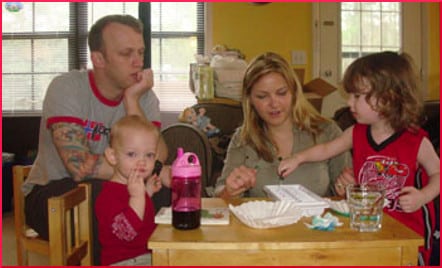
To achieve durable change and sustained weight loss, kids need a lot of buttressing, a lot of outside support, and what’s more, they need the right kind of support. Anything that sounds like nagging will be rebuffed and have the opposite effect from what was intended.
The far future is hard enough to deal with, but for kids even the near future is too long to wait for the benefits of good behavior. Self-discipline and impulse control are difficult even for grownups. Kids who have developed a trust bond with the world can get behind delayed gratification and self-binding.
When the trust bond is broken or has never had a chance to exist, everything becomes exponentially more difficult. If a child has been led to believe that a sled will be under the Christmas tree and the sled doesn’t show up, why should he believe anything a grownup says about the future?
That was a relatively benign example. For many kids, life is far more precarious and tenuous than we can comfortably acknowledge. The sociological term is “unreliable environment,” and millions of kids live in chaotic environments that are unreliable every single day, in myriad ways. If only a magic wand could be waved to guarantee that all parents everywhere would be loving, fair, consistent, dependable, and supportive. If only.
Automaticity
Cognitive behavioralists have found that after an active period of family-based intervention, healthful new behaviors are maintained by extended contact and duration. In the family, helping a kid sustain weight loss over the long term can be an emotional minefield. Any juncture where a decision must be made is an opening for potential strife. A method that doesn’t involve discussion, or even thinking, could be a plus.
When Dr. Denise Wilfley set out to work on successful interventions to reduce childhood obesity, she saw the necessity to “make the healthy choice the easy choice,” in the words of journalist Erin Fults, who wrote:
To determine the most effective weight control strategy, Wilfley’s team must evaluate the contexts in which children and families live and work to both maximize the prompts for healthy behaviors and minimize the prompts for unhealthy ones. Her team uses a novel socio-environmental approach that builds on the “traffic light” plan, color-coding foods and opportunities for physical activities in a user-friendly manner. Families are encouraged to go for healthy GREEN foods and activities, exercise caution around YELLOW foods and activities, and stop and plan how to limit unhealthy RED foods and activities.
Habit can work either for or against a person, and the trick is to make automaticity a positive trait. What if there were a really simple way to shop for weight loss-friendly foods, without the need for decision-making? This is what the traffic-light system implies. Can such an elementary concept really make a difference?
Next: a closer look at the traffic light labeling system.
Your responses and feedback are welcome!
Source: “Dr. Denise Wilfley: Successful Interventions for Curbing Pediatric Obesity,” NIH.gov, 11/23/11
Image by U.S. Army

 FAQs and Media Requests:
FAQs and Media Requests: 











